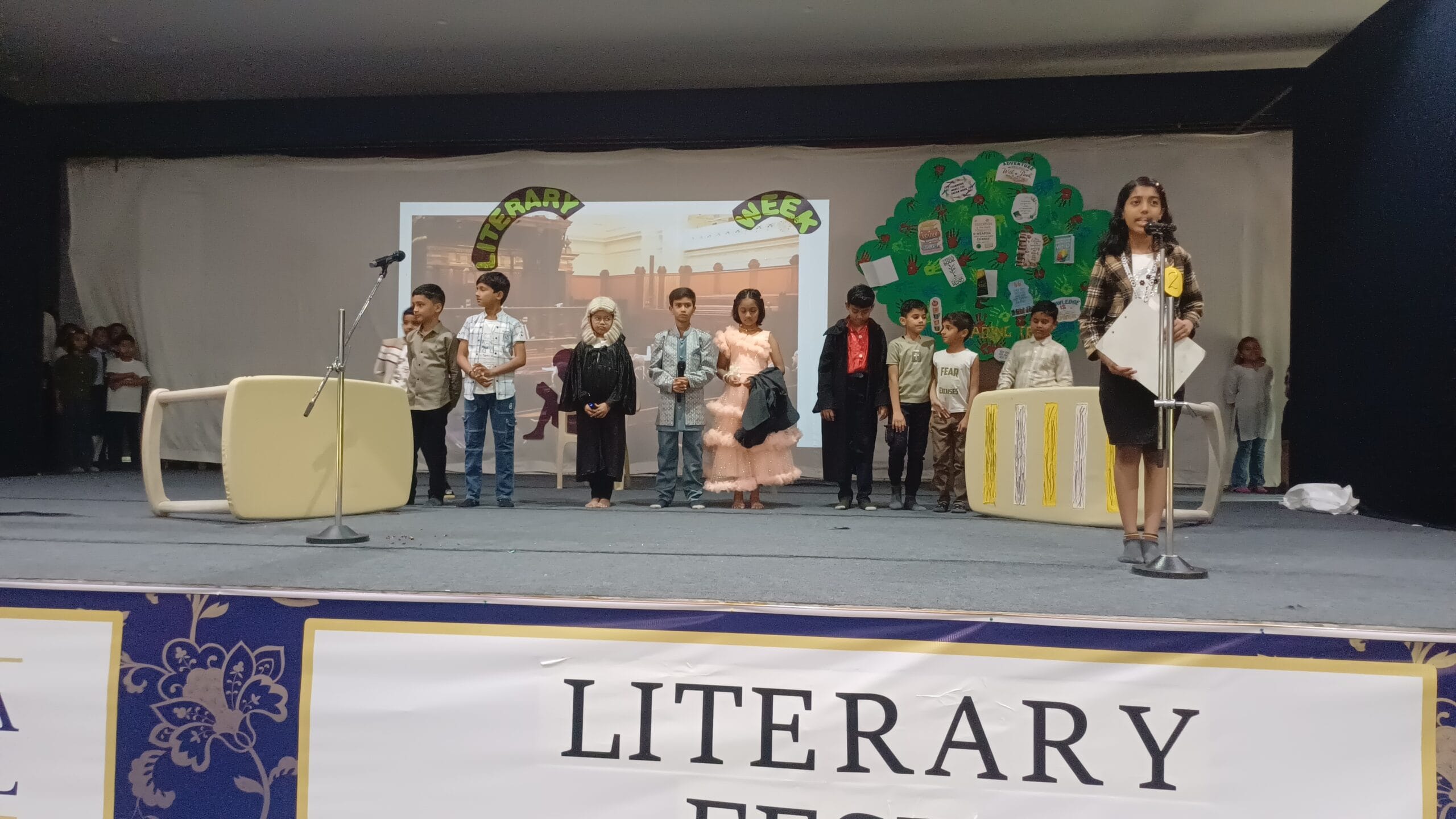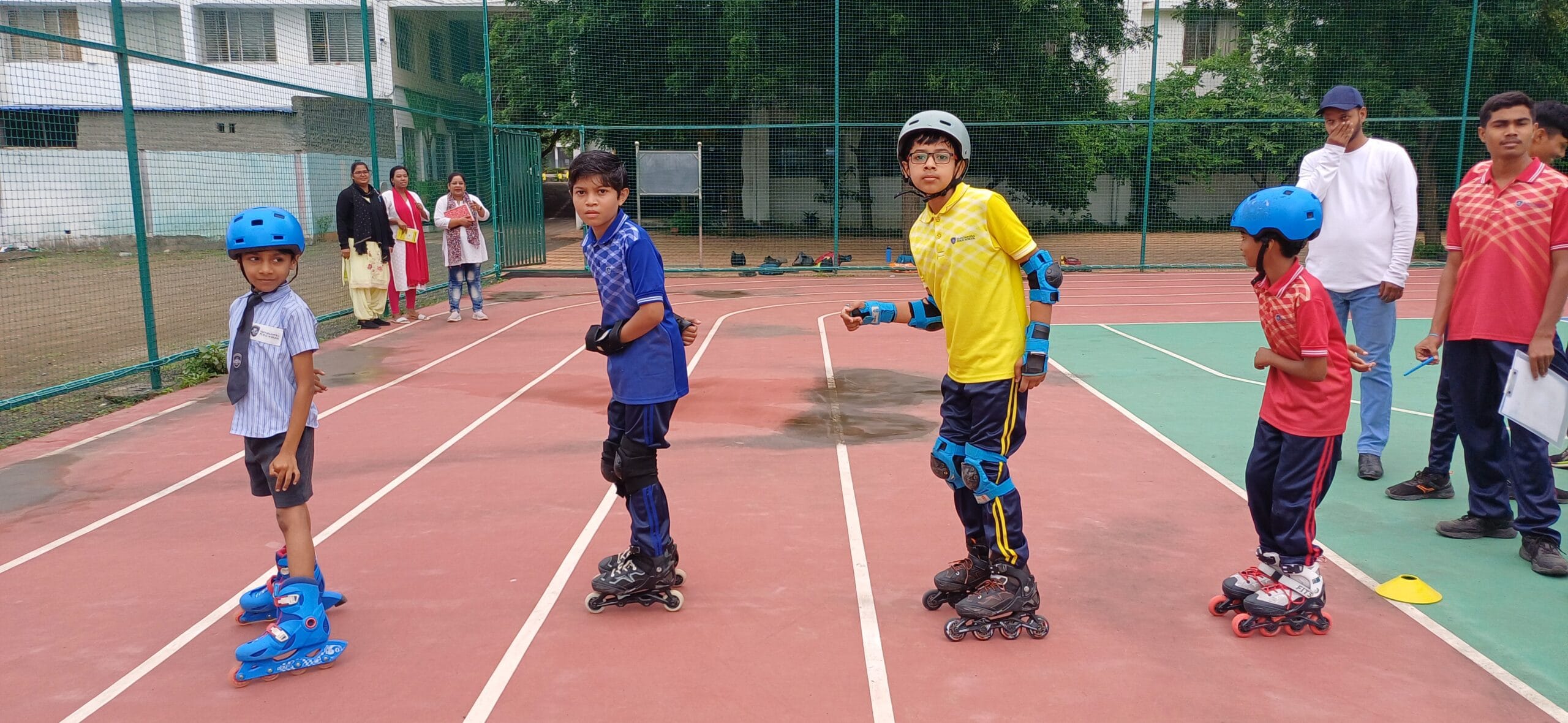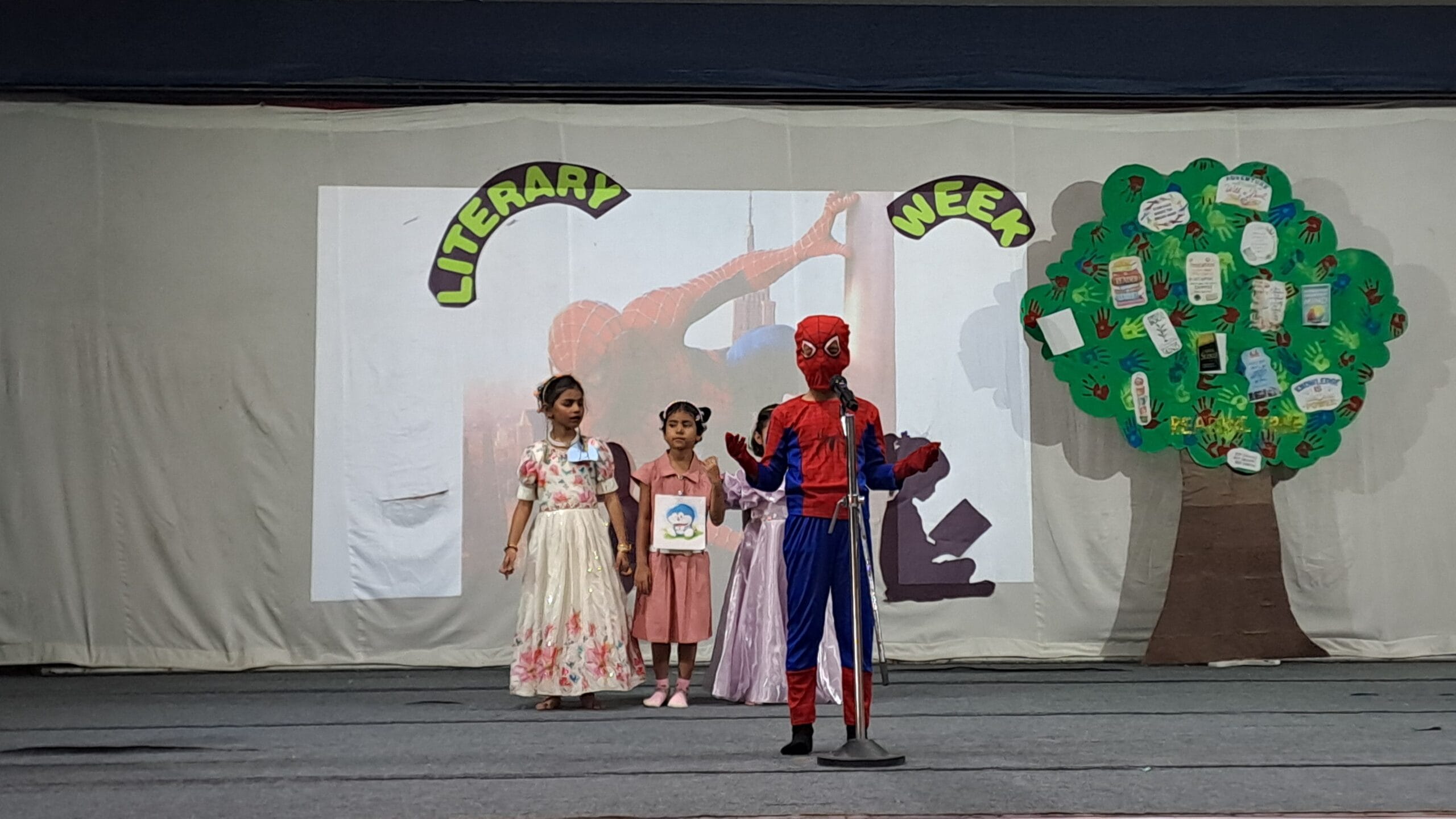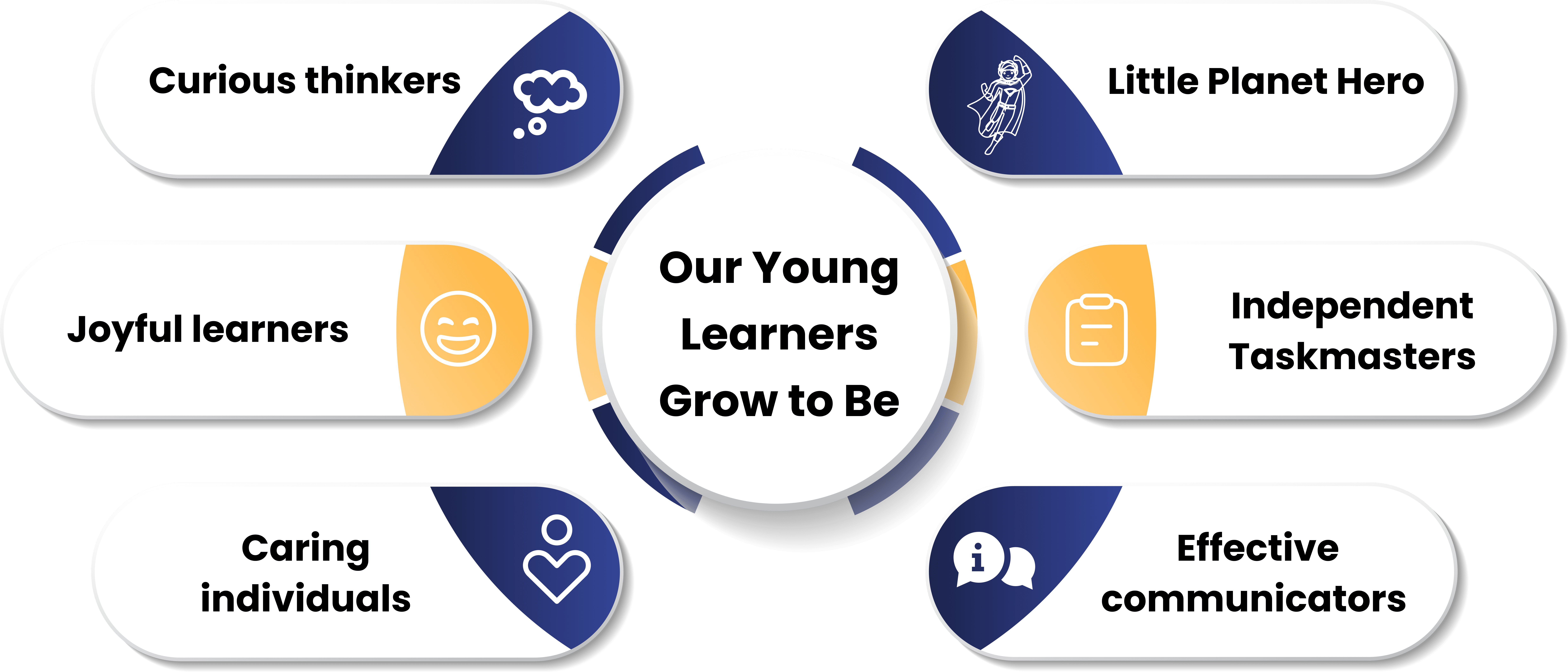Foundational (Nursery to II)
Foundational Stage Curriculum
“In our early years program, learning is not a race—it’s a journey of wonder, growth, and joy.”
Building Bright Foundations Through Joyful Learning
The foundation years are a magical time of discovery, imagination, and growth. At our school, the Foundational Stage program (Nursery to Grade 2) is carefully designed to nurture each child’s natural curiosity while laying the foundation for a lifetime of confident learning.
The Foundation Stage Program is divided into two key stages: Early Childhood Education (Nursery to Upper Kindergarten) and Lower Primary (Grades 1 to 2). Each stage is thoughtfully structured to support age-appropriate developmental milestones while ensuring a seamless and enriching transition into formal schooling.
We believe that young children learn best through play, exploration, and meaningful interactions. Our classrooms are joyful, welcoming spaces where every child feels seen, heard, and valued.
Our Approach to Foundational Stage Education
Our Foundational Stage curriculum is:
- Play-based and child-led, encouraging imagination and creativity
- Holistic, supporting emotional, social, physical, and cognitive development
- Experiential, allowing children to learn by doing, observing, and reflecting
- Culturally rooted, yet open to global perspectives
- Flexible, tailored to different learning styles, interests, and developmental needs
Key Learning Areas
We focus on integrated, theme-based learning across the following domains:
- Language and Communication
Developing speaking, listening, early reading, and writing skills through stories, songs, rhymes, and conversations. - Numeracy and Logical Thinking
Understanding numbers, patterns, shapes, and problem-solving through hands-on activities and real-life connections. - Knowledge and Exploration of the World
Engaging with the environment, seasons, animals, plants, and everyday science through observation and discovery. - Creative Arts and Expression
Encouraging self-expression through music, movement, drawing, dance, and imaginative play. - Physical Development
Enhancing fine and gross motor skills through games, yoga, sports, and creative movement. - Social and Emotional Growth
Building confidence, empathy, friendships, and self-regulation through play, group activities, and circle time.
The Learning Process
- Through Curiosity →Inquiry-Based Exploration
Children are natural questioners; we nurture their curiosity by encouraging them to wonder, observe, and ask why. - Through Play → Playful Learning Experiences
Hands-on, imaginative play helps children make sense of the world, solve problems, and express ideas freely. - Through Routine and Rhythm → Predictable Structures and Secure Environments
Consistent routines create emotional safety, support self-regulation, and build independence in young learners. - Through Celebration → Joyful Community Connections
We honor milestones, cultures, and achievements, fostering belonging and emotional growth in every child.
Assessment for Growth
In early childhood education, we recognize that each child’s learning journey is unique. Instead of formal tests, we use observations, authentic documentation, and thoughtful conversations to understand and support every child’s development.
- Portfolios, Artwork, and Photos
(Infographic Notes) A curated collection of each child’s work—including drawings, hands-on activities, and captured moments—shows progress across developmental domains. These portfolios highlight the child’s creativity, independence, and engagement in real-world, meaningful tasks. - Developmental Checklists and Anecdotal Notes
(Infographic Notes) Educators observe children closely and record their growth in areas such as practical skills, language, numeracy, fine and gross motor coordination, and social-emotional learning. This documentation is used to support planning and ensure each child is met at their individual stage of development. - Parent-Teacher Conferences Focused on Holistic Growth
(Infographic Notes) Rather than focusing on grades or scores, conferences serve as a space for reflection, celebrating achievements and discussing milestones. These collaborative conversations deepen the home-school partnership and help parents understand how their child is growing as a confident, capable, and curious learner.
Grade 1–2 Curriculum: Nurturing Foundations for Lifelong Learning
At Maharashtra Public School (MPS), Grades 1 and 2 represent the critical bridge between early childhood exploration and structured learning. Grounded in the guiding principles of the National Education Policy (NEP) 2020 and enriched by best international pedagogical practices, our approach reflects a deep commitment to developing not only foundational literacy and numeracy but also curiosity, creativity, and character.
Why We Teach the Way We Do
Children in this age group are naturally inquisitive and learn best through interaction, movement, and meaning-making. At MPS, we believe that education at this stage must go beyond memorization to nurture critical thinking, emotional resilience, and social responsibility. Our goal is to lay a strong foundation for lifelong learning while enabling each child to find joy and purpose in their educational journey.
How Learning Happens at MPS
Our MPS Education Model™ emphasizes a holistic, child-centered methodology that integrates:
- Competency-Based Learning: Focusing on what children can do with what they know, not just what they remember. Competencies span literacy, numeracy, emotional intelligence, and collaborative skills.
- Inquiry-Based Instruction: Encouraging students to pose questions, seek answers, and make connections through guided exploration.
- Project-Based Learning (PBL): Interdisciplinary projects that allow students to explore real-life themes such as community helpers, habitats, and festivals, making learning relevant and meaningful.
- Thematic and Integrated Units: Subjects are not taught in silos but are interwoven into rich themes that reflect the real world—such as “My Neighbourhood,” “Seasons and Celebrations,” or “Plants and Living Things.”
Classrooms are dynamic learning spaces where flexible seating, learning corners, and resource-rich environments encourage student agency and creativity. Teachers act as facilitators and co-learners, adapting instruction based on ongoing observation and reflection.
What Our Students Learn
Our curriculum aligns with CBSE outcomes while integrating global learning frameworks.
Key learning domains include:
- Language and Literacy: Emphasizing listening, phonemic awareness, decoding, comprehension, vocabulary building, creative writing, and confident verbal expression through story circles, reading workshops, and dialogue-based learning.
- Mathematics: Focusing on number sense, place value, basic operations, patterns, measurement, and spatial awareness using manipulatives, math games, and real-world problem-solving scenarios.
- Environmental and Social Studies: Exploring family, community, nature, seasons, animals, plants, water, and sustainability through field trips, nature walks, and class discussions.
- Art, Music, and Movement: Providing avenues for emotional expression, rhythm, and aesthetic appreciation through clay work, painting, folk songs, dance, and dramatics.
- Physical Development and Wellness: Fostering motor skills, body awareness, coordination, and mindfulness through structured play, physical education, and yoga.
- Values, Citizenship, and SEL (Social Emotional Learning): Integrating kindness, gratitude, empathy, and cooperation into daily routines, circle time, classroom responsibilities, and collaborative activities.
Collaboration and Communication
MPS values the role of peer collaboration in early learning. Activities are designed to enhance teamwork, turn-taking, peer feedback, and shared goal-setting. Students participate in buddy reading, group projects, and class discussions that strengthen their interpersonal and communication skills.
We also maintain strong school-home partnerships. Regular parent-teacher meetings, student-led conferences, learning showcases, and open classrooms ensure that families remain engaged in their child’s progress and school life.
Assessment for Learning and Growth
Our assessment framework for Grades 1–2 is formative, inclusive, and reflective. Tools include:
- Learning Portfolios that capture student work, self-reflections, and teacher observations.
- Performance Tasks that allow children to apply learning in authentic contexts.
- Anecdotal Records and Checklists to track developmental milestones and skill progression.
- Ongoing Feedback focused on encouragement, effort, and growth rather than comparison or competition.
Looking Ahead
By the end of Grade 2, MPS students emerge as:
- Inquisitive learners who take initiative and explore new ideas.
- Effective communicators who listen, express, and respond thoughtfully.
- Caring friends who show empathy, kindness, and respect.
- Independent thinkers who manage tasks and solve problems creatively.
- Planet protectors who engage with sustainability and community care.
Our foundational program ensures every child builds the academic, social, and emotional confidence to thrive in the years ahead—and ultimately, in a changing world.
Our Young Learners Grow to Be
- Curious thinkers who explore with wonder.
- Effective communicators who express ideas through words and actions.
- Caring individuals who share, collaborate, and show empathy.
- Independent Taskmasters who take pride in everyday tasks.
- Joyful learners who are excited to come to school every day.
- Little Planet Hero who takes small steps to make a big difference.




“We do not teach children what to think—we help them learn how to love learning.”
Our Foundational Stage program ensures that every child’s first steps into school are full of joy, discovery, and a strong sense of belonging.
